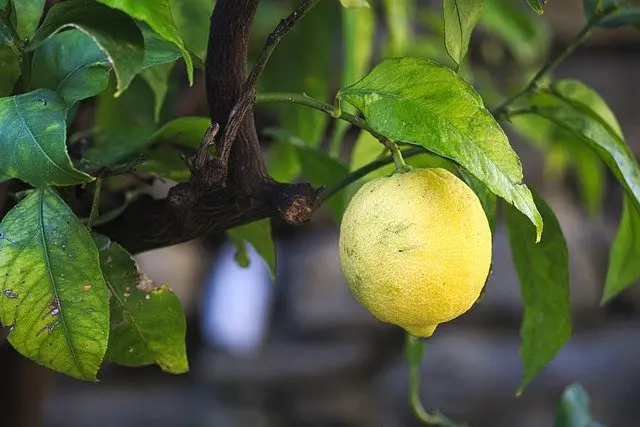For people wanting to grow a few lemon trees in their garden, the risks of pests and wastage of space may be a reason to change their minds!
But, there is a way to combat both problems in one go. Companion plants for lemon tree orchards will help your lemon tree by keeping away pests, inviting pollinators, and enhancing the appearance of your dull trees.
Let’s start by elaborating on why exactly your lemon trees need companion plants.
Why Do Lemon Trees Need Companion Plants?
If you look at a well set-up garden, you may wonder if the plants are randomly placed or carefully chosen.
The truth is that they are selected based on their characteristics and properties. This does make sense the more you think about it.
Why plant any plant near your lemon tree when there are plants that can provide benefits to your lemon tree? Not sure about the assistance some plants can offer your lemon tree? Here they are.
Companion plants can offer the following to lemon trees:
- Greatly improves chances of pollination by inviting pollinating insects and birds.
- Improving scent and overall appearance of lemon tree areas in the garden.
- Protection from pests by having deterrent properties.
- Plants that improve soil quality.
Improving pollination will go a long way in helping to increase lemon output. Additionally, controlling pests will contribute toward keeping your lemon tree healthy enough to keep growing and producing fruit.
Also, flowering plants can make your trees look good when they are not in bloom.
Lemon tree growing issues you may encounter: Solutions to Lemon tree leaves turning brown.
By now you must be wondering which are the best companion plants for lemon trees that will provide all these benefits.
Here are the best lemon tree companions based on the benefit accrued by the lemon tree.
Companion Plants that Assist Lemon Tree Pollination
Most trees and plants adopt a cross-pollination mechanism. This is when pollen from one tree/plant must fertilize the stigma of another plant. However, lemon trees mostly use self-pollination.
Pollen from one flower on the same tree must fall onto another flower’s stigma, again on the same tree.
Below are a bunch of flowers that will bring insects into your garden to help pull off this important process.
Yarrow
The perennial, yarrow is a great way to increase the number of lemon tree pollinators. Yarrow plants will flower very close to the blooming time of lemon trees. These plants will bloom in spring and summer.
This timing makes it possible for pollinating insects to arrive in time for the lemon tree to bloom. This is important since fruiting quality and quantity may depend on pollination. Yarrow flowers are very appealing to insects with their variety of colors.
The colors yarrow flowers come in are red, purple, orange, pink, white, and even yellow.
With such an assortment, you won’t have difficulty attracting beneficial insects to the garden.
Mexican Bush Sage
This sage plant is yet another herb similar to lavender in terms of its violet to purple flowers. This manageable bush will flower from summer to fall and requires full sun.
Meaning that you don’t have to worry about providing shade to them. This is pleasing to hear if you have limited shade.
Mexican sage is particularly popular as being a butterfly magnet. Although, it doesn’t appeal too much to bees!
But, you can use another lemon tree companion plant to fix this. Another interesting characteristic of this herb is that it keeps rabbits and deer away!
Calendula
Commonly known as Marigolds, this group of flowers adds a warm feel to the garden with their brightly shaded flowers.
Calendula is actually a dual-purpose garden companion plant. They attract both pollinating insects and predatory insects as well.
All marigold plants are even better for planting under your lemon tree or other tall trees in the vicinity. This is because they are intolerant of full sun and very high temperatures. They may require a bit more watering than your lemon tree.
Borage
Also going by the name Starflower, borage is a flowering annual herb whose leaves and flowers are edible. This non-aggressive low-maintenance herb is a summer to fall bloomer that prefers full or part sunlight.
This herb is a pest and disease repellent while still attracting pollen transferring organisms.
Some organisms that borage will bring to your lemon tree are bees, butterflies, and even hummingbirds. That’s not all, predatory insects will find borage interesting.
Lemon Tree Companion Plants that Complement in Scent and Appearance
You will find that your lemon tree won’t always be a lush green tree with lemons hanging from the stems! There will be times when lemon trees aren’t the most appealing plant in the garden. It’s in times like these that you need plants to help beautify your lemon orchard.
Here are a few plants that look amazing around your lemon trees. Also, some of them have other advantages of being lemon tree companion plants.
Roses
Who would say no to having roses in their garden? Roses don’t just add physical appeal to any garden space.
They also emit a scent that can be caught as you walk past these plants. Oddly, rose scents make quite a good combination with lemon tree fragrances.
There is no limit to how close roses can be to your lemon trees. That’s because roses, like lemon trees, require slightly acidic soil in the range of pH 6.0 to pH 7.0.
So, you will not have to sacrifice one for the other. Enjoy the scenic and fragrant presence of both of these plants.
Jasmine
Most but not all Jasmine varieties are fragrant. But, it’s more than just odor that makes jasmine and lemon trees a good match. Jasmine is popular for being an evergreen or semi-evergreen plant that blooms.
Growing jasmine under and around your lemon trees will make for a great companion to increase your garden’s physical presence. Besides, jasmine will look good with the other lemon tree companion plants you will choose to grow.
Lavender
If you are into the scenic appearance of colorful herbs, lavender is one plant you can’t afford to ignore growing! Lavender comes in green to silver foliage colors with impressive violet to purple colored flowers.
Flowers bloom for quite some time and will not leave your lemon tree space bare and dull for long.
Besides being an appealing sight around your lemon trees, lavender even manages to repel a few troublesome insects. This includes mosquitoes, fleas, ticks, and possibly mice as well!
Want lavender? Follow our growing and care tips for French Lavender.
Lemon Tree Companion Plants that Impede Insect Pests
Insects are a common pest that garden and even commercial lemon growers have to deal with.
Luckily, garden lemon planters have the edge here. Growing certain types of plants under or near your lemon trees can deter some common pests.
The following plants are popular in local gardens as natural means of controlling and even eliminating insect pests. Plant them around your lemons to have a pest-free lemon tree.
Dill
Starting off the long list of insect-repellent lemon tree companions is dill. It is a herb originating from the Mediterranean that is popular in the kitchen (particularly in the preparation of dill pickles!).
Growing this herb definitely helps your lemon trees and other garden plants for that matter.
Dill invites several beneficial pests that are natural predators of your everyday pests. Examples of the insects it invites are ladybugs, parasitic wasps, lace wigs, hoverflies, aphid midges, tachinid flies, etc.
These insects can take care of most pests by feeding on them or their larvae. To tackle worms, scatter diatomaceous earth over the ground below the lemon tree. When worms or slugs slide over this, they will be cut.
Fennel
Are you having problems in your garden with snails and slugs? If so, growing fennel near your lemon tree is the best way to ward them off.
Slugs and snails are no good to have in the garden particularly if you are growing vegetables. They are voracious eaters!
Fennel is a snail and slug deterrent as well as a useful spice in the kitchen!
Lemongrass
Most people have lemongrass in their garden. But, this next point may prompt you to change the location of your lemongrass bushes. Lemongrass is proven to dissuade mosquitoes and even some variants of flies.
This is great to hear since a lemon tree canopy can be a spot that mosquitoes could use to hide. Not to mention flies sitting on your lemons is not a sight you would want to imagine!
Lemon Tree Companion Plants That Improve Soil Quality
Lemon trees are not very low-scale feeders. They require quite a steady flow of nutrients and the absence of the right minerals and nutrients will lead to growth impairment.
Lemon trees aren’t dormant in winter and can do with the extra nutrients you provide them with.
These two plants are great natural fertilizing agents.
Peas and Alfalfa
Peas and Alfalfa are popular legume family plants. This group of plants is very popular for one thing. Any guesses what that is? It’s for fixing Nitrogen back in the soil.
Every plant needs this mineral and lemon trees are no exception. You can help enrich the soil by letting your legumes grow and then cutting them back. Because doing so will fix the Nitrogen back into the soil.
Worst Companion Plants For Lemon Trees
Not every plant out there is meant to be planted with lemon trees! Here are a few plants or trees that you should keep away from your lemon trees.
Root Crops
Root crops and vegetables like potatoes, carrots, beets, and turnips are not the best partners for your lemon tree. But, what’s the reason behind this forbidden partnership?
Well, harvesting any of these roots could disturb the lemon tree roots. So lemon tree roots are moderately shallow, staying in the top 24 inches (61 cm) of the soil.
The root, bulb, and tuber plants/vegetables could alter and influence the nutrients and minerals in the soil.
Fruit Trees
The last thing you need is for your lemon tree to have to compete with other trees for its growth and survival! But, this could very well happen if you plant other fruit trees within the vicinity of your lemon tree.
Keep your lemon tree clear and far from any potentially nutrient-greedy trees and plants for that matter.
Is it a good idea to plant trees near your lemon tree? Read: Can lemon trees grow in shade?
Conclusion
Lemon tree companion planting is essential if you want the best for your lemon trees and ultimately your garden as well.
Lemon tree companions can help to deter pests, invite beneficial, predatory, and pollinating insects, and improve soil quality.
Good companion plants for lemon trees are yarrow, sage, fennel, dill, lemongrass, peas, alfalfa, roses, jasmine, borage, and Calendula.
Making good use of these companion plants is highly suggested. Better use them if you want the best possible lemon tree growth and lemon production!
FAQs
What are the Best Companion Plants for Lemon Tree?
The best companion plants for lemon tree areas in the garden are mostly made up of a group of herbs due to their pest deterring abilities.
This includes Yarrow, Lavender, Dill, Fennel, Lemongrass, Mexican Sage, Borage, etc. Other good lemon tree companion plants are Roses, Calendula (Marigolds), and Jasmine.
What shouldn’t you plant lemon trees with?
You should not plant fruit trees and root vegetables with lemon trees. Also, do not plant any tree that attracts the same pests that lemon trees can be attacked by.


